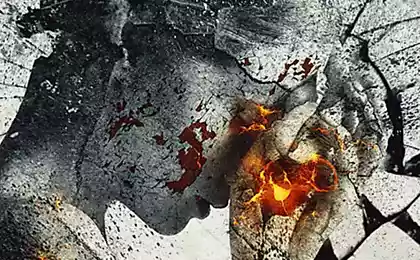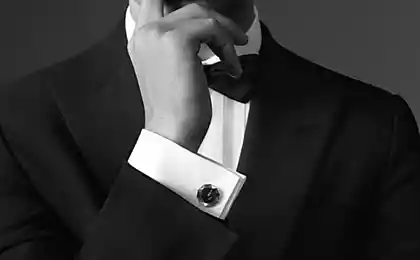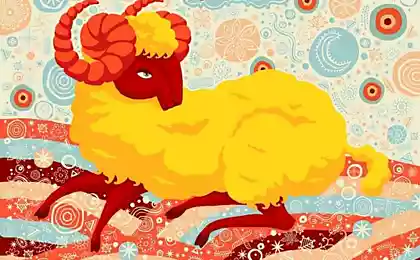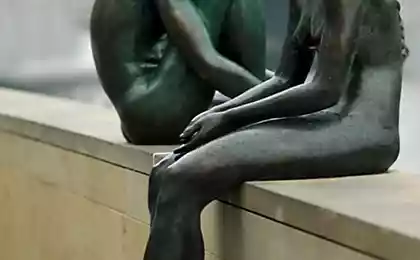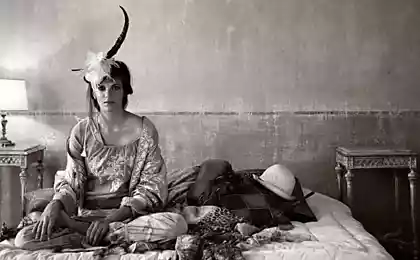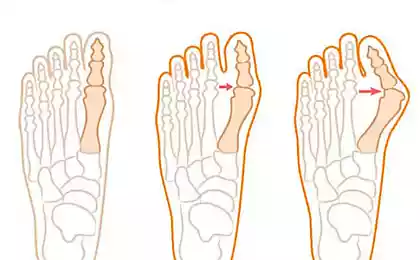355
Self-doubt: Looking Inside
What are we talking about here? Let’s try to clarify the terminology we use. What is “self-doubt”? What is "confidence"? What's that about?
The best way to touch this problem is to look inside yourself and find its sprouts in your own life. And maybe very soon you will find that these are not just individual weeds in the garden, but real poisonous jungle. A lot of work is not required here, you just need to focus correctly.
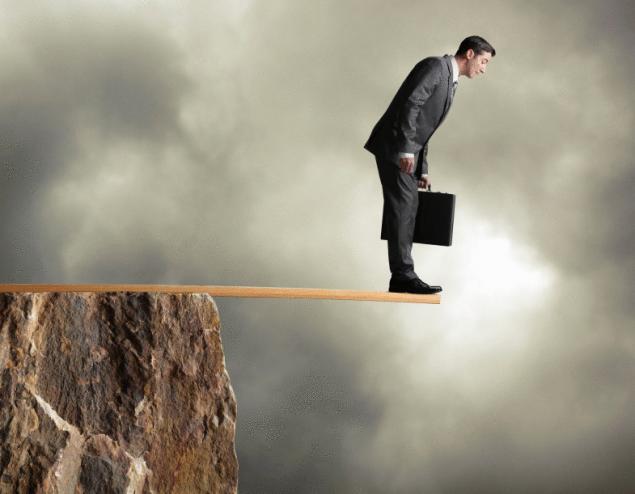
We are not talking about the strict scientific definition of the inferiority complex as described by Adler. Let’s try to deal with the problem of self-doubt, as we see it with our own eyes. And there should be no doubts and excuses - the feeling we are talking about here is inherent in everyone without exception. It's all about you! And if one renounces it is only because many years of skillful self-deception have taught him to confuse top with bottom, and confidence with its complete absence.
Let’s start with how uncertainty manifests itself in life. This is well known to everyone: general self-doubt or unbreakable self-confidence, avoidance of decisions or blindly frightened recklessness in making them, irresponsibility or hyperresponsibility, fear of manifesting one’s desires or deliberate complacency, abandoning one’s point of view or imposing it on everyone around, an infantile need for love or cruel insensitivity, touchiness or confidentiality ... and so on. All everyday (non-clinical) psychopathology is a manifestation of self-doubt.
Note that all manifestations of self-doubt are bipolar, and this is often where the first and most naive mistake in understanding our problem occurs. Insecurity and self-confidence are the same thing. Behind both extremes is the same feeling, differing only the way of psychological defense against it. One man falls into him and sprinkles his head with ashes, thus avoiding further pokes, the other does his best to prove that he has no doubt about himself, but the zeal with which he does it betrays him with guts. It's obvious here.
In essence, self-doubt is a feeling of vague but profound anxiety about one’s place in life, or one might call it an intuitive doubt of the same content. Feeling, intuition, uncertain anxiety, an obsessive question hovering in the air - am I a creature trembling? You may call it in your own way, but you definitely have it.
If you sincerely believe that all this has nothing to do with you, then one of three: either you are completely deprived of the ability to self-reflect, or you are a great fool, or you are not a person. Self-doubt has been at the core of the human being ever since the thing that psychologists call the “Ego” formed in our psychic structure. Ego and self-doubt are essentially the same thing. There is no self-confident person, only a person who is well protected from the frightening truth.
For the sake of completeness, it can be said that whenever a person admits that he is unhappy in one way or another, rest assured that behind this is his self-doubt, his sense of insecurity about his own worth. There is no other misfortune – all human grief revolves around our self and the question of its dignity.
If you look through the magnifying glass, you can say that self-doubt is a sense of dissonance between the position of the selfish consciousness, infected with the idea of self-worth from the first years of life, and the biological truth that on a planetary scale, man is no more important than the smallest microorganism (and another outbreak of Ebola is a good reminder of that). And if we get the spirit to assess human significance on the scale of the universe, the result will become even more obvious and dramatic.
Now imagine what will happen to a person who, on the one hand, knows the truth about his position in this world, and, on the other hand, grows up and is brought up in a society where the idea of self-esteem is considered the highest moral value, and the pursuit of social success is the meaning of life? What is the scale of a person’s inner conflict when it comes to the psychological division of inflated selfish dignity by zero? Wouldn't that person feel a little insecure?
This is the conflict that from the beginning of time sharpens a person from within, forcing him to commit the greatest and most terrible deeds. The conflict of good and evil, like any other confrontation, is nothing but a reflection of the inner struggle between truth and falsehood in the soul of every individual in our civilized but unconscious society.
Can this conflict be healed? Let's figure it out...
Conventional medicine
Returning to the everyday level of understanding, let’s see what is usually meant by self-doubt, what is considered its causes, and how it is proposed to reach the opposite pole – a firm belief in one’s worthiness.
One could formulate generalized answers to all these questions, but let’s take a closer look at what the collective mind says about it. Here are some quotes from articles that Google gives out on the first page of the search for “insecurity”. Of course, such materials are far from a storehouse of human wisdom, but their position in the search results suggests that the opinions expressed in them are very well replicated. Okay.
If the child often suffered failures, and others at the same time focused on them his attention, then in adulthood he will see only his shortcomings, and the advantages - not to notice.
It’s worth remembering that people aren’t born “confident” or “insecure.” Feeling of insecurity – acquired and in most cases caused by past unsuccessful experience and, as a result, doubts about new beginnings: “What if it doesn’t work?”, “And this is the last time...”, “And what will they think about me if...”
Self-confidence is the knowledge that you are loved and accepted as you are, that you are needed by a certain group of people (friends, relatives, colleagues), and that in this vast, beautiful world you are not alone.
Self-doubt, like some character traits, can not only be acquired during life, but also inherited from parents, grandparents. A child whose relatives are not quite self-confident, inheriting it genetically, tends to grow up less confident than his peers.
Nowadays, people tend to focus on negative information. A vivid example of filling people’s thinking with negativity is the news, and how many people start the day with watching the news, programming themselves with negativity for the whole day without even knowing it. It is television that creates uncertainty about the future and a sense of insecurity.
And now the solutions proposed in the same articles:
Appreciate all your efforts and consider even the small success you have achieved. Praise yourself for the result achieved. If you don’t succeed, praise yourself for trying because you have overcome your own fear and insecurity. After a few weeks, you will notice that the problem of insecurity begins to disappear.
Every time I approached the mirror at any time of the day and in any form, I told myself that I loved and respected myself. Looking at my reflection, when I liked myself the most, I tried to fix it in my memory, and to feel myself in this state constantly. I began to respect myself and praise myself for the slightest successes and achievements. I stopped doing self-administration.
Love and respect yourself. Always feel yourself in the best image you have created. Praise yourself for the smallest achievements and successes. Avoid self-criticism and criticism. Do not compare yourself to the ideal you have created in your imagination. Don’t put too high demands on yourself. Repeat the affirmations.
"Yakah!" In the morning, when you open your eyes, your first word is “I.” Loud, clear, with pride and confidence. Be proud of everything you have or did today or twenty years ago. Whatever. Say, “I’ll tell you this,” “I’m telling you this,” etc., pressing “I.” Insist and assert yourself and your self in a world where there are so many other selves but not as unique and special as your selves.
The formula for autosuggestion is “I am 100% sure.” This is a very simple, effective tool, and at the same time complex. It is necessary just like a mantra, you can talk to yourself, and when there is no one around, out loud, say “I am sure!” Repeat this constantly, every day - in the morning, afternoon, evening and before going to bed (and even better in a dream).
Of course, this is only a caricature collection of answers to illustrate the total misunderstanding that reigns in undisturbed heads. But, believe me, these quotes did not have to be searched out and taken out of context, this is exactly what lies at the very top - in popular well-published articles on the topic of confidence-insecurity.
Here we see an illustration of the general stereotype that insecurity is an unnatural, painful condition acquired in the course of a conscious life, and that it can and should be cured - to gain confidence. And as the main way of getting rid of various techniques are offered to strengthen a person’s faith in his own significance.
The logic is simple and clear: if a person’s belief in their uniqueness, peculiarity and importance is well strengthened, it will allow a person to overcome the anxious feeling that calls into question his whole life. In other words, if you scream loud enough, you can cry out your fear. And then the answer to the question of how to gain self-confidence is the obvious recommendation in your madness: learn to proclaim your “I”, your importance, your dignity, and you will be saved.
Of course, you can find other recommendations – more thoughtful and sensible, but to find them among the heap of stereotypical magazine advice, you will have to make some efforts. It is understandable - a call for a more sober look at yourself, will always lose in popularity advice to love your reflection in the mirror.
Relatively sound advice, which is still occasionally found, is a cautious proposal to conduct an audit and adjust your self-esteem in accordance with real achievements. Compared to the above nonsense, this is practically a revolutionary revelation. Instead of convincing yourself of your own importance, it is suggested to give yourself the back of the head and face the truth.
One might say that this is the first half-step to growing up, but it is followed by two full steps back. Yes, soberly assessing their achievements, a person reduces the level of their personal ambitions and begins to strengthen their self-esteem not affirmations, but real deeds. This makes it more tangible and provides some kind of ground under your feet. But at the same time, he has a false belief that self-confidence is the result of real achievements, which puts him in an even more dangerous position.
The transition from a completely contrived self-esteem to a “realistic” one solves only the most superficial layer of the real problem. Not so much decides as disguises. The core of self-doubt lies far beyond the realm of social assessments and relationships. Whatever a person’s “real” achievements may be, this does not solve the problem of initial insecurity. Worse, the analgesic effect and the stable repeatability of the result, when new achievements become another and effective dose of a mental analgesic, become a real trap for a person - believing that a solution has been found, he stops looking for another answer.
The general result of such recommendations is that the delta between the real value, which a person insists on an insistent inner voice, and the price he ascribes to himself at the level of self-aggression or social achievement, becomes greater. The conflict between truth and lies is getting worse, and with each day spent building self-esteem, more energy is needed to run away from yourself and your fears. And so on to complete mental exhaustion...
Alternative medicine
There is no cure for self-doubt... just as there is no cure for sanity, even though the Cuckoo's Nest department is doing its best.
However, traditional medicine, from which, as joked, no one leaves healthy, sometimes still misses patients from their clinging paws. What saves them is that they know where they are before their business and body are sent to a biological waste disposal service.
And if we manage to escape the many well-wishers while the gunpowder is not quite damp, we find ourselves in the territory of serious psychological self-exploration and finally move from ruthless treatment to a careful study of the problem.
We have previously suggested that the root of evil is a false self-conceit that counters a sense of intuitive anxiety about one’s place in the world, and if so, this is where the focus should be.
Self-importance is a layered system of psychological defense that we build from the bottom up and strengthen throughout our lives. The most primitive and easily observed level of defense is social conceit, the evaluation of one’s worth within the framework of a moral coordinate system. A deeper and more subtle level is existential conceit, an attempt to define and assert the meaning of one’s existence. The last and subtle level can be conventionally called universal or spiritual conceit – the proclamation of its autonomy from the universal ocean of being.
Social conceit
This layer should be well known to all who in the study of psychology went beyond reading glossy magazines. We have already discussed the first half in the right direction – the transition in the formation of self-esteem from fantasies and fairy tales about yourself to real measurable achievements. A simple illustration might be the difference between “I deserve a lot of money” and “I deserve as much as I earn.” The transition from one point of view to another is accompanied by a decrease in claims, and this is where we get the positive effect of reducing false personal volume.
But moving to realistic self-esteem at the level of practical achievement is too small a victory for it to make decisive sense. The bulk of social conceit lies in the sphere of moral viability. In part, this also manifests itself through deeds and deeds: if a person does nothing “bad” and sometimes does “good”, then on a practical level he can be considered “good”. But we know that to restrain evil intent is not the same as not having it, and to do something indicatively good is not the same as having good intentions.
Therefore, the next obvious step in adjusting self-esteem is to take into account not only real cases, but also real feelings and intentions. This is what deep psychology is about—the fight with the Shadow and the Person—with the two basic self-deceptions that allow a person to have a falsely embellished picture of himself.
Working at this level, a person finds that deep down he is not at all what he used to see himself. Finding inside your personal Mr. Hyde, the beast is a profound shock, after which it is not so easy to recover. But this is what marks the first step to true adulthood – recognizing your dark side, tearing off false masks, a seven-mile step towards the truth.
This work, if done sincerely, has the same effect of devaluing the individual, diminishing the pretensions, and this massive defeat, while extremely painful, reduces tension on the most important spiritual front, the war between lying and truth about oneself.
With each such victorious retreat, man loses some of his former dignity, his importance, his importance. But when the pain passes and the dust subsides, the person discovers that it is strangely easier to breathe. The feeling of self-doubt that tormented him becomes less painful, and life begins to play with new, hitherto unprecedented, colors. Defeat leads to victory.
But along with the reduction of borders, the defense capability of the mental state improves, and the next stage of the correction of self-conceit is even more difficult. A sharp decrease in the intensity of internal conflict naturally leads to a decrease in motivation to continue self-exploration. Many people get stuck at this stage, believing that this is the pinnacle of psychological development. Adulthood never becomes Maturity.
Existential conceit
Here, the game becomes more subtle, but still remains accessible for easy understanding. As at the social level, it is a question of false claims, but no longer in the sphere of achievements and moral evaluations, but in the importance attached to them. The value of previous victories—everything that seemed unshakably important—is suddenly called into question. Money, recognition, relationships, fighting evil, justice – what matters and what doesn’t? Where's the truth? What's the point?
Following the feeling of anxiety that does not leave him, the person ceases to be content with ready-made answers and for the first time tries to answer all these questions independently. And very soon, as if waking up, he discovers that his usual supports in life hang in the air and have no basis - pure faith inherited from his parents and teachers.
And the first thing that comes into question is the value of the social achievements we talked about above. Money, success, power all make sense within a very limited range, just as skillful possession of the ball matters only within the framework of a football game. But in the case of football, we always remember that it is just a game, and in the case of the pursuit of social success, we easily fall into the illusion that it is one of the indisputably important aspects of being, stop seeing it as entertainment and turn success into the cause of our happiness or unhappiness. Losing football is sad, but it will never make a person unhappy - only slightly upset. And defeat on the social field for some becomes an excuse to commit suicide. That's the power of illusion.
But this is the very surface of an existential problem. It is easy to understand and accept that material values and social victories are transitory and conditional. The first lesson of philosophy that gives the false impression of learned wisdom. It is much more difficult to take the next step and recognize the questionable value of what is most often contrasted with material relationships. Friendship, family, children—that’s what becomes life-saving self-deception when the ladder leading to social heights begins to stagger.
Belief in the value of human relationships is such a huge layer of meaning that for most of those who have broken through the illusion of social success, it is irresistible. In essence, it is stuck on a primitive biological level, but elevated to the highest value of human existence. The power of this belief and its analgesic effect is so great that it allows you to hide from the truth until the very end ... and the person dies quietly with the feeling of an excellent student who has performed the task well. But why would he think that was the job?
Love, friendship, relationships are just another screen. No one knows what the meaning of our lives is, and it scares the hell out of people, because without clear rules, it is impossible to define yourself and your place in life. The shield of the pursuit of success, which protects against feelings of insecurity, falls out of hand, and then the family and other aspects of human relationships become a convenient response that is easy to swallow and again plunge into oblivion.
If familiarity with the bitter sense of self-deception in the earlier stages of the work was not in vain, the background of all relationships that previously seemed sacred becomes obvious and frightening, because their only purpose is to escape from the truth, from themselves, from their anxieties and doubts. And then, having lost with faith in a relationship another big piece of his soul, the person is faced with the next obstacle.
Here we come to a belief in the existence of good and evil, which also turns out to be just another line of defense. The nature of this shield is no longer so obvious. The point here is not whether there is good or evil in the world, but that man takes the liberty to judge what is what.
The same thing happens with the meaning of life that no one knows. By refusing to accept the absence of an answer, we artificially invent our own meaning and convince ourselves that it is the answer. But if you look carefully, it turns out that the proposed answer is not the result of a deep study of the question, but pursues purely personal benefit - the new meaning of life is declared exactly what it is easier and more convenient for us to assert ourselves in the future.
Good and evil repeat the same maneuver. No one knows the criteria of true good or true evil, but if we look around, we see that people live as if they know these criteria well and for certain. How is that possible? The same trick works – we invent the rules of the game at will and in full accordance with the principle of personal gain. We assign to the good what is advantageous for us to consider as such, that which we can conform without any effort. And evil is declared all that we are uncomfortable and disliked in other people, and from that moment on they become sinners in our eyes, although in reality they have only crossed our path. Good and evil have always been and will always be the subject of our selfish arbitrariness. Isn't that pride?
It is necessary to touch this awareness, and the whole world around begins to collapse. The boundaries of right and wrong are blurred, and a person is suspended in weightlessness. It becomes almost impossible to answer the question “Who am I?” because all previous systems of reporting lose their meaning. There is no longer a line by which one can continue to measure one’s own significance – all deception and convention. Man discovers his crushing insignificance on the scale of human existence, and the last loophole remains – to force himself to believe in a new extra-human coordinate system, which often becomes one or another form of spirituality with its saving endless labyrinths, allowing you to hide your head in the sand in the most reliable and sophisticated way.
Having admitted defeat on such a deep level, man will never be the same again. The crisis associated with the loss of all landmarks puts a person on his knees and demolishes his personality almost to the ground. And here, having almost completely lost himself, a person feels great relief, as if a bag of bricks had been removed from him, which he had been dragging all his life. Man reaches Maturity, and the conflict between doubt and conceit disappears from view again, leaving him in full confidence that this time the problem is finally solved.
And it becomes a trap again. If one is allowed to be content with the result achieved, when the individual is practically destroyed, but still alive and capable of creating illusions, Maturity will never become Wisdom.
Spiritual conceit
I am not very authorized to speak about this stage of transformation, since I am far from sure that I am at least approaching it myself, so I write briefly and with a bold caveat that this is all just a hypothesis. Beware!
When the whole world of human values is destroyed, there are at least a couple of steps that can be seen and walked, remaining within the framework of the usual personal perception – the ruins and foundations of the personality that survived after the storm. At this level, there is no clear sequence of discoveries - everything happens simultaneously.
The most painful is the remnants of personal attachments. Tastes, preferences, hopes, dreams and other emotional clues that still allow the personality to retain its shape. At this level, there are no judgments about right or wrong, only their subjective evaluations, which, however, keep the almost vanished individuality from completely dissolving.
The other frontier is a living conviction of free will and of one’s ability to act autonomously. On a conceptual level, it is not so difficult to guess that personal will is a highly questionable concept. But only direct knowledge is taken into account, which is acquired when the person has almost faded away and cannot maintain the illusion of his participation in decision-making with the same efficiency. The glitches of the “Matrix”, through which the structure of the universal being sees, are becoming more and more obvious, and the words that God’s will cease to seem mystical nonsense at all, taking away from a barely living person the last crumbs of faith in his autonomy.
Another plane and one of the last strongholds of individuality is the belief in the value of conceptual thinking and the “knowledge” built on its basis about the nature of reality. Just as all human values fall apart on close examination, conceptual notions dissipate, if we look at them with an open mind and trace them back to their origin – the belief in the existence of reality itself. Take a closer look at your idea that the Earth is round, and you will understand what it is about.
The key concept, and perhaps the final frontier beyond which the very concept of “personality” loses all meaning, is the belief in the existence of boundaries between individual objects and, most importantly, between object and subject. The root and core of human conceit is pretension and complete conviction in its own separateness from the rest of the universe. The primary confrontation and discernment—the “I” and the “World”—from which the personality with all its more primitive ambitions begins.
Space ball
So, what's all this about? Metaphorically, we can say that we are considering the story of a tangle of threads that, having consciousness, found itself in a predicament. Somewhere on the deep level of his woolen soul, a frightening conjecture arose that the tangle is not an independent phenomenon, but only a form of existence of threads. Since then, he has lost his peace and started to doubt himself.
Other tangles also faced a similar guess, but quickly found a calming theory that if you wind more threads on yourself, the "tangle" of the tangle becomes more obvious. And now they're all running away from their fear, competing in who winds the most strings.
But the bigger and fatter they get, the more frightening the prospect is that the guess will turn out to be true. It's one thing to lose yourself when you're small and light, and it's another thing to lose yourself when you've turned into an industrial reel and wound miles of string. Therefore, the race for threads goes on indefinitely until the bobbin is charged into the universal loom, and the true nature of every tangle becomes mercilessly obvious. What remains when the ball unwinds to the end?
They say it doesn’t matter how you live your life, the end is the same. But we can still assume that a life lived in eternal horror and exhausting pursuit of new achievements is not exactly the fate that one can wish for. And now our tangle is making a risky move. Instead of putting new strings on himself, he begins to unwind them.
With each twist and layer it becomes smaller and lighter. The idea that it is very important to be a real tangle gradually leaves him, and with it goes the fear of the truth, which he once suggested intuition. Their place is occupied by a new, previously unknown, sense of trust in life and the process that happens to it. The unravelling of the tangle continues, and at one truly beautiful moment the thread ends. The guess is confirmed - the tangle is no more, there is only a thread.
It would seem that the ball disappeared, died, but if you look closely, we will understand that the tangle never existed, and therefore there was no one to die. A tangle is just an idea, a fiction, the effect of threads wound on each other. All the time there was only one thread, which for unknown reasons gets tangled in a tangle and starts in it the process of artificial self-consciousness - shy, selfish, concerned about its importance, but at the same time quite funny.
And the process of unwinding brings everything back to its place. The illusion, or rather the tangle effect, dissolves, leaving only the original reality, which was before birth and will remain after the death of this illusion.
And if we now return to human reality with our problem of self-doubt, we will see the same processes: the common fear of nothingness and two ways in which we can try to cope with it. The ending in both cases is more or less the same, the difference is only in how the allotted time passes from the moment of occurrence to the moment of dissolution of the illusion.
As we can see, the approach of running away from fear is much more widespread. Maybe because it's really better - we can hardly know for sure. Moreover, they say, the way in the opposite direction – to unravel their delusions – no one chooses voluntarily, just as no one chooses to voluntarily commit suicide, which, in fact, is the process of unwinding the tangle.
That is, it is not that the way of debunking one’s own ego is better and more correct than the way of magnifying it. We just look at the situation from a broader perspective and say there is another option. And from time to time, we meet people who have gone this way.
And interestingly, it is these strange people who make the strongest impression on us – in them we see the state of peace and balance that we would like to have. And it is in them that we find the natural powerless embodiment of all the ideals of humanity. Isn't that weird?
Unravelling the tangle of his doubts, a person at some point forgets the very concepts of confidence and self-doubt. Their place is taken by something new - a sense of self-confidence, which has nothing to do with the pathetic attempts of the individual to assert their importance. As soon as the rabid personal ambitions are subdued, all extraneous fears and worries go away by themselves, giving way to a clear understanding that everything in this world is fine, everything is in its place and everything is fine.
This special state of trust in life as a whole, and in oneself as a part of it, is achieved only at the cost of a complete abandonment of self-esteem. And this terrible prospect—the loss of all personal dignity—does not lead a man to fall...only here does his true elevation begin.
Source: satway.ru
Source: /users/1077
The best way to touch this problem is to look inside yourself and find its sprouts in your own life. And maybe very soon you will find that these are not just individual weeds in the garden, but real poisonous jungle. A lot of work is not required here, you just need to focus correctly.

We are not talking about the strict scientific definition of the inferiority complex as described by Adler. Let’s try to deal with the problem of self-doubt, as we see it with our own eyes. And there should be no doubts and excuses - the feeling we are talking about here is inherent in everyone without exception. It's all about you! And if one renounces it is only because many years of skillful self-deception have taught him to confuse top with bottom, and confidence with its complete absence.
Let’s start with how uncertainty manifests itself in life. This is well known to everyone: general self-doubt or unbreakable self-confidence, avoidance of decisions or blindly frightened recklessness in making them, irresponsibility or hyperresponsibility, fear of manifesting one’s desires or deliberate complacency, abandoning one’s point of view or imposing it on everyone around, an infantile need for love or cruel insensitivity, touchiness or confidentiality ... and so on. All everyday (non-clinical) psychopathology is a manifestation of self-doubt.
Note that all manifestations of self-doubt are bipolar, and this is often where the first and most naive mistake in understanding our problem occurs. Insecurity and self-confidence are the same thing. Behind both extremes is the same feeling, differing only the way of psychological defense against it. One man falls into him and sprinkles his head with ashes, thus avoiding further pokes, the other does his best to prove that he has no doubt about himself, but the zeal with which he does it betrays him with guts. It's obvious here.
In essence, self-doubt is a feeling of vague but profound anxiety about one’s place in life, or one might call it an intuitive doubt of the same content. Feeling, intuition, uncertain anxiety, an obsessive question hovering in the air - am I a creature trembling? You may call it in your own way, but you definitely have it.
If you sincerely believe that all this has nothing to do with you, then one of three: either you are completely deprived of the ability to self-reflect, or you are a great fool, or you are not a person. Self-doubt has been at the core of the human being ever since the thing that psychologists call the “Ego” formed in our psychic structure. Ego and self-doubt are essentially the same thing. There is no self-confident person, only a person who is well protected from the frightening truth.
For the sake of completeness, it can be said that whenever a person admits that he is unhappy in one way or another, rest assured that behind this is his self-doubt, his sense of insecurity about his own worth. There is no other misfortune – all human grief revolves around our self and the question of its dignity.
If you look through the magnifying glass, you can say that self-doubt is a sense of dissonance between the position of the selfish consciousness, infected with the idea of self-worth from the first years of life, and the biological truth that on a planetary scale, man is no more important than the smallest microorganism (and another outbreak of Ebola is a good reminder of that). And if we get the spirit to assess human significance on the scale of the universe, the result will become even more obvious and dramatic.
Now imagine what will happen to a person who, on the one hand, knows the truth about his position in this world, and, on the other hand, grows up and is brought up in a society where the idea of self-esteem is considered the highest moral value, and the pursuit of social success is the meaning of life? What is the scale of a person’s inner conflict when it comes to the psychological division of inflated selfish dignity by zero? Wouldn't that person feel a little insecure?
This is the conflict that from the beginning of time sharpens a person from within, forcing him to commit the greatest and most terrible deeds. The conflict of good and evil, like any other confrontation, is nothing but a reflection of the inner struggle between truth and falsehood in the soul of every individual in our civilized but unconscious society.
Can this conflict be healed? Let's figure it out...
Conventional medicine
Returning to the everyday level of understanding, let’s see what is usually meant by self-doubt, what is considered its causes, and how it is proposed to reach the opposite pole – a firm belief in one’s worthiness.
One could formulate generalized answers to all these questions, but let’s take a closer look at what the collective mind says about it. Here are some quotes from articles that Google gives out on the first page of the search for “insecurity”. Of course, such materials are far from a storehouse of human wisdom, but their position in the search results suggests that the opinions expressed in them are very well replicated. Okay.
If the child often suffered failures, and others at the same time focused on them his attention, then in adulthood he will see only his shortcomings, and the advantages - not to notice.
It’s worth remembering that people aren’t born “confident” or “insecure.” Feeling of insecurity – acquired and in most cases caused by past unsuccessful experience and, as a result, doubts about new beginnings: “What if it doesn’t work?”, “And this is the last time...”, “And what will they think about me if...”
Self-confidence is the knowledge that you are loved and accepted as you are, that you are needed by a certain group of people (friends, relatives, colleagues), and that in this vast, beautiful world you are not alone.
Self-doubt, like some character traits, can not only be acquired during life, but also inherited from parents, grandparents. A child whose relatives are not quite self-confident, inheriting it genetically, tends to grow up less confident than his peers.
Nowadays, people tend to focus on negative information. A vivid example of filling people’s thinking with negativity is the news, and how many people start the day with watching the news, programming themselves with negativity for the whole day without even knowing it. It is television that creates uncertainty about the future and a sense of insecurity.
And now the solutions proposed in the same articles:
Appreciate all your efforts and consider even the small success you have achieved. Praise yourself for the result achieved. If you don’t succeed, praise yourself for trying because you have overcome your own fear and insecurity. After a few weeks, you will notice that the problem of insecurity begins to disappear.
Every time I approached the mirror at any time of the day and in any form, I told myself that I loved and respected myself. Looking at my reflection, when I liked myself the most, I tried to fix it in my memory, and to feel myself in this state constantly. I began to respect myself and praise myself for the slightest successes and achievements. I stopped doing self-administration.
Love and respect yourself. Always feel yourself in the best image you have created. Praise yourself for the smallest achievements and successes. Avoid self-criticism and criticism. Do not compare yourself to the ideal you have created in your imagination. Don’t put too high demands on yourself. Repeat the affirmations.
"Yakah!" In the morning, when you open your eyes, your first word is “I.” Loud, clear, with pride and confidence. Be proud of everything you have or did today or twenty years ago. Whatever. Say, “I’ll tell you this,” “I’m telling you this,” etc., pressing “I.” Insist and assert yourself and your self in a world where there are so many other selves but not as unique and special as your selves.
The formula for autosuggestion is “I am 100% sure.” This is a very simple, effective tool, and at the same time complex. It is necessary just like a mantra, you can talk to yourself, and when there is no one around, out loud, say “I am sure!” Repeat this constantly, every day - in the morning, afternoon, evening and before going to bed (and even better in a dream).
Of course, this is only a caricature collection of answers to illustrate the total misunderstanding that reigns in undisturbed heads. But, believe me, these quotes did not have to be searched out and taken out of context, this is exactly what lies at the very top - in popular well-published articles on the topic of confidence-insecurity.
Here we see an illustration of the general stereotype that insecurity is an unnatural, painful condition acquired in the course of a conscious life, and that it can and should be cured - to gain confidence. And as the main way of getting rid of various techniques are offered to strengthen a person’s faith in his own significance.
The logic is simple and clear: if a person’s belief in their uniqueness, peculiarity and importance is well strengthened, it will allow a person to overcome the anxious feeling that calls into question his whole life. In other words, if you scream loud enough, you can cry out your fear. And then the answer to the question of how to gain self-confidence is the obvious recommendation in your madness: learn to proclaim your “I”, your importance, your dignity, and you will be saved.
Of course, you can find other recommendations – more thoughtful and sensible, but to find them among the heap of stereotypical magazine advice, you will have to make some efforts. It is understandable - a call for a more sober look at yourself, will always lose in popularity advice to love your reflection in the mirror.
Relatively sound advice, which is still occasionally found, is a cautious proposal to conduct an audit and adjust your self-esteem in accordance with real achievements. Compared to the above nonsense, this is practically a revolutionary revelation. Instead of convincing yourself of your own importance, it is suggested to give yourself the back of the head and face the truth.
One might say that this is the first half-step to growing up, but it is followed by two full steps back. Yes, soberly assessing their achievements, a person reduces the level of their personal ambitions and begins to strengthen their self-esteem not affirmations, but real deeds. This makes it more tangible and provides some kind of ground under your feet. But at the same time, he has a false belief that self-confidence is the result of real achievements, which puts him in an even more dangerous position.
The transition from a completely contrived self-esteem to a “realistic” one solves only the most superficial layer of the real problem. Not so much decides as disguises. The core of self-doubt lies far beyond the realm of social assessments and relationships. Whatever a person’s “real” achievements may be, this does not solve the problem of initial insecurity. Worse, the analgesic effect and the stable repeatability of the result, when new achievements become another and effective dose of a mental analgesic, become a real trap for a person - believing that a solution has been found, he stops looking for another answer.
The general result of such recommendations is that the delta between the real value, which a person insists on an insistent inner voice, and the price he ascribes to himself at the level of self-aggression or social achievement, becomes greater. The conflict between truth and lies is getting worse, and with each day spent building self-esteem, more energy is needed to run away from yourself and your fears. And so on to complete mental exhaustion...
Alternative medicine
There is no cure for self-doubt... just as there is no cure for sanity, even though the Cuckoo's Nest department is doing its best.
However, traditional medicine, from which, as joked, no one leaves healthy, sometimes still misses patients from their clinging paws. What saves them is that they know where they are before their business and body are sent to a biological waste disposal service.
And if we manage to escape the many well-wishers while the gunpowder is not quite damp, we find ourselves in the territory of serious psychological self-exploration and finally move from ruthless treatment to a careful study of the problem.
We have previously suggested that the root of evil is a false self-conceit that counters a sense of intuitive anxiety about one’s place in the world, and if so, this is where the focus should be.
Self-importance is a layered system of psychological defense that we build from the bottom up and strengthen throughout our lives. The most primitive and easily observed level of defense is social conceit, the evaluation of one’s worth within the framework of a moral coordinate system. A deeper and more subtle level is existential conceit, an attempt to define and assert the meaning of one’s existence. The last and subtle level can be conventionally called universal or spiritual conceit – the proclamation of its autonomy from the universal ocean of being.
Social conceit
This layer should be well known to all who in the study of psychology went beyond reading glossy magazines. We have already discussed the first half in the right direction – the transition in the formation of self-esteem from fantasies and fairy tales about yourself to real measurable achievements. A simple illustration might be the difference between “I deserve a lot of money” and “I deserve as much as I earn.” The transition from one point of view to another is accompanied by a decrease in claims, and this is where we get the positive effect of reducing false personal volume.
But moving to realistic self-esteem at the level of practical achievement is too small a victory for it to make decisive sense. The bulk of social conceit lies in the sphere of moral viability. In part, this also manifests itself through deeds and deeds: if a person does nothing “bad” and sometimes does “good”, then on a practical level he can be considered “good”. But we know that to restrain evil intent is not the same as not having it, and to do something indicatively good is not the same as having good intentions.
Therefore, the next obvious step in adjusting self-esteem is to take into account not only real cases, but also real feelings and intentions. This is what deep psychology is about—the fight with the Shadow and the Person—with the two basic self-deceptions that allow a person to have a falsely embellished picture of himself.
Working at this level, a person finds that deep down he is not at all what he used to see himself. Finding inside your personal Mr. Hyde, the beast is a profound shock, after which it is not so easy to recover. But this is what marks the first step to true adulthood – recognizing your dark side, tearing off false masks, a seven-mile step towards the truth.
This work, if done sincerely, has the same effect of devaluing the individual, diminishing the pretensions, and this massive defeat, while extremely painful, reduces tension on the most important spiritual front, the war between lying and truth about oneself.
With each such victorious retreat, man loses some of his former dignity, his importance, his importance. But when the pain passes and the dust subsides, the person discovers that it is strangely easier to breathe. The feeling of self-doubt that tormented him becomes less painful, and life begins to play with new, hitherto unprecedented, colors. Defeat leads to victory.
But along with the reduction of borders, the defense capability of the mental state improves, and the next stage of the correction of self-conceit is even more difficult. A sharp decrease in the intensity of internal conflict naturally leads to a decrease in motivation to continue self-exploration. Many people get stuck at this stage, believing that this is the pinnacle of psychological development. Adulthood never becomes Maturity.
Existential conceit
Here, the game becomes more subtle, but still remains accessible for easy understanding. As at the social level, it is a question of false claims, but no longer in the sphere of achievements and moral evaluations, but in the importance attached to them. The value of previous victories—everything that seemed unshakably important—is suddenly called into question. Money, recognition, relationships, fighting evil, justice – what matters and what doesn’t? Where's the truth? What's the point?
Following the feeling of anxiety that does not leave him, the person ceases to be content with ready-made answers and for the first time tries to answer all these questions independently. And very soon, as if waking up, he discovers that his usual supports in life hang in the air and have no basis - pure faith inherited from his parents and teachers.
And the first thing that comes into question is the value of the social achievements we talked about above. Money, success, power all make sense within a very limited range, just as skillful possession of the ball matters only within the framework of a football game. But in the case of football, we always remember that it is just a game, and in the case of the pursuit of social success, we easily fall into the illusion that it is one of the indisputably important aspects of being, stop seeing it as entertainment and turn success into the cause of our happiness or unhappiness. Losing football is sad, but it will never make a person unhappy - only slightly upset. And defeat on the social field for some becomes an excuse to commit suicide. That's the power of illusion.
But this is the very surface of an existential problem. It is easy to understand and accept that material values and social victories are transitory and conditional. The first lesson of philosophy that gives the false impression of learned wisdom. It is much more difficult to take the next step and recognize the questionable value of what is most often contrasted with material relationships. Friendship, family, children—that’s what becomes life-saving self-deception when the ladder leading to social heights begins to stagger.
Belief in the value of human relationships is such a huge layer of meaning that for most of those who have broken through the illusion of social success, it is irresistible. In essence, it is stuck on a primitive biological level, but elevated to the highest value of human existence. The power of this belief and its analgesic effect is so great that it allows you to hide from the truth until the very end ... and the person dies quietly with the feeling of an excellent student who has performed the task well. But why would he think that was the job?
Love, friendship, relationships are just another screen. No one knows what the meaning of our lives is, and it scares the hell out of people, because without clear rules, it is impossible to define yourself and your place in life. The shield of the pursuit of success, which protects against feelings of insecurity, falls out of hand, and then the family and other aspects of human relationships become a convenient response that is easy to swallow and again plunge into oblivion.
If familiarity with the bitter sense of self-deception in the earlier stages of the work was not in vain, the background of all relationships that previously seemed sacred becomes obvious and frightening, because their only purpose is to escape from the truth, from themselves, from their anxieties and doubts. And then, having lost with faith in a relationship another big piece of his soul, the person is faced with the next obstacle.
Here we come to a belief in the existence of good and evil, which also turns out to be just another line of defense. The nature of this shield is no longer so obvious. The point here is not whether there is good or evil in the world, but that man takes the liberty to judge what is what.
The same thing happens with the meaning of life that no one knows. By refusing to accept the absence of an answer, we artificially invent our own meaning and convince ourselves that it is the answer. But if you look carefully, it turns out that the proposed answer is not the result of a deep study of the question, but pursues purely personal benefit - the new meaning of life is declared exactly what it is easier and more convenient for us to assert ourselves in the future.
Good and evil repeat the same maneuver. No one knows the criteria of true good or true evil, but if we look around, we see that people live as if they know these criteria well and for certain. How is that possible? The same trick works – we invent the rules of the game at will and in full accordance with the principle of personal gain. We assign to the good what is advantageous for us to consider as such, that which we can conform without any effort. And evil is declared all that we are uncomfortable and disliked in other people, and from that moment on they become sinners in our eyes, although in reality they have only crossed our path. Good and evil have always been and will always be the subject of our selfish arbitrariness. Isn't that pride?
It is necessary to touch this awareness, and the whole world around begins to collapse. The boundaries of right and wrong are blurred, and a person is suspended in weightlessness. It becomes almost impossible to answer the question “Who am I?” because all previous systems of reporting lose their meaning. There is no longer a line by which one can continue to measure one’s own significance – all deception and convention. Man discovers his crushing insignificance on the scale of human existence, and the last loophole remains – to force himself to believe in a new extra-human coordinate system, which often becomes one or another form of spirituality with its saving endless labyrinths, allowing you to hide your head in the sand in the most reliable and sophisticated way.
Having admitted defeat on such a deep level, man will never be the same again. The crisis associated with the loss of all landmarks puts a person on his knees and demolishes his personality almost to the ground. And here, having almost completely lost himself, a person feels great relief, as if a bag of bricks had been removed from him, which he had been dragging all his life. Man reaches Maturity, and the conflict between doubt and conceit disappears from view again, leaving him in full confidence that this time the problem is finally solved.
And it becomes a trap again. If one is allowed to be content with the result achieved, when the individual is practically destroyed, but still alive and capable of creating illusions, Maturity will never become Wisdom.
Spiritual conceit
I am not very authorized to speak about this stage of transformation, since I am far from sure that I am at least approaching it myself, so I write briefly and with a bold caveat that this is all just a hypothesis. Beware!
When the whole world of human values is destroyed, there are at least a couple of steps that can be seen and walked, remaining within the framework of the usual personal perception – the ruins and foundations of the personality that survived after the storm. At this level, there is no clear sequence of discoveries - everything happens simultaneously.
The most painful is the remnants of personal attachments. Tastes, preferences, hopes, dreams and other emotional clues that still allow the personality to retain its shape. At this level, there are no judgments about right or wrong, only their subjective evaluations, which, however, keep the almost vanished individuality from completely dissolving.
The other frontier is a living conviction of free will and of one’s ability to act autonomously. On a conceptual level, it is not so difficult to guess that personal will is a highly questionable concept. But only direct knowledge is taken into account, which is acquired when the person has almost faded away and cannot maintain the illusion of his participation in decision-making with the same efficiency. The glitches of the “Matrix”, through which the structure of the universal being sees, are becoming more and more obvious, and the words that God’s will cease to seem mystical nonsense at all, taking away from a barely living person the last crumbs of faith in his autonomy.
Another plane and one of the last strongholds of individuality is the belief in the value of conceptual thinking and the “knowledge” built on its basis about the nature of reality. Just as all human values fall apart on close examination, conceptual notions dissipate, if we look at them with an open mind and trace them back to their origin – the belief in the existence of reality itself. Take a closer look at your idea that the Earth is round, and you will understand what it is about.
The key concept, and perhaps the final frontier beyond which the very concept of “personality” loses all meaning, is the belief in the existence of boundaries between individual objects and, most importantly, between object and subject. The root and core of human conceit is pretension and complete conviction in its own separateness from the rest of the universe. The primary confrontation and discernment—the “I” and the “World”—from which the personality with all its more primitive ambitions begins.
Space ball
So, what's all this about? Metaphorically, we can say that we are considering the story of a tangle of threads that, having consciousness, found itself in a predicament. Somewhere on the deep level of his woolen soul, a frightening conjecture arose that the tangle is not an independent phenomenon, but only a form of existence of threads. Since then, he has lost his peace and started to doubt himself.
Other tangles also faced a similar guess, but quickly found a calming theory that if you wind more threads on yourself, the "tangle" of the tangle becomes more obvious. And now they're all running away from their fear, competing in who winds the most strings.
But the bigger and fatter they get, the more frightening the prospect is that the guess will turn out to be true. It's one thing to lose yourself when you're small and light, and it's another thing to lose yourself when you've turned into an industrial reel and wound miles of string. Therefore, the race for threads goes on indefinitely until the bobbin is charged into the universal loom, and the true nature of every tangle becomes mercilessly obvious. What remains when the ball unwinds to the end?
They say it doesn’t matter how you live your life, the end is the same. But we can still assume that a life lived in eternal horror and exhausting pursuit of new achievements is not exactly the fate that one can wish for. And now our tangle is making a risky move. Instead of putting new strings on himself, he begins to unwind them.
With each twist and layer it becomes smaller and lighter. The idea that it is very important to be a real tangle gradually leaves him, and with it goes the fear of the truth, which he once suggested intuition. Their place is occupied by a new, previously unknown, sense of trust in life and the process that happens to it. The unravelling of the tangle continues, and at one truly beautiful moment the thread ends. The guess is confirmed - the tangle is no more, there is only a thread.
It would seem that the ball disappeared, died, but if you look closely, we will understand that the tangle never existed, and therefore there was no one to die. A tangle is just an idea, a fiction, the effect of threads wound on each other. All the time there was only one thread, which for unknown reasons gets tangled in a tangle and starts in it the process of artificial self-consciousness - shy, selfish, concerned about its importance, but at the same time quite funny.
And the process of unwinding brings everything back to its place. The illusion, or rather the tangle effect, dissolves, leaving only the original reality, which was before birth and will remain after the death of this illusion.
And if we now return to human reality with our problem of self-doubt, we will see the same processes: the common fear of nothingness and two ways in which we can try to cope with it. The ending in both cases is more or less the same, the difference is only in how the allotted time passes from the moment of occurrence to the moment of dissolution of the illusion.
As we can see, the approach of running away from fear is much more widespread. Maybe because it's really better - we can hardly know for sure. Moreover, they say, the way in the opposite direction – to unravel their delusions – no one chooses voluntarily, just as no one chooses to voluntarily commit suicide, which, in fact, is the process of unwinding the tangle.
That is, it is not that the way of debunking one’s own ego is better and more correct than the way of magnifying it. We just look at the situation from a broader perspective and say there is another option. And from time to time, we meet people who have gone this way.
And interestingly, it is these strange people who make the strongest impression on us – in them we see the state of peace and balance that we would like to have. And it is in them that we find the natural powerless embodiment of all the ideals of humanity. Isn't that weird?
Unravelling the tangle of his doubts, a person at some point forgets the very concepts of confidence and self-doubt. Their place is taken by something new - a sense of self-confidence, which has nothing to do with the pathetic attempts of the individual to assert their importance. As soon as the rabid personal ambitions are subdued, all extraneous fears and worries go away by themselves, giving way to a clear understanding that everything in this world is fine, everything is in its place and everything is fine.
This special state of trust in life as a whole, and in oneself as a part of it, is achieved only at the cost of a complete abandonment of self-esteem. And this terrible prospect—the loss of all personal dignity—does not lead a man to fall...only here does his true elevation begin.
Source: satway.ru
Source: /users/1077
Startup for $100: 5 bestsellers about how to start your own business without the cost
5 interesting facts about buckwheat


